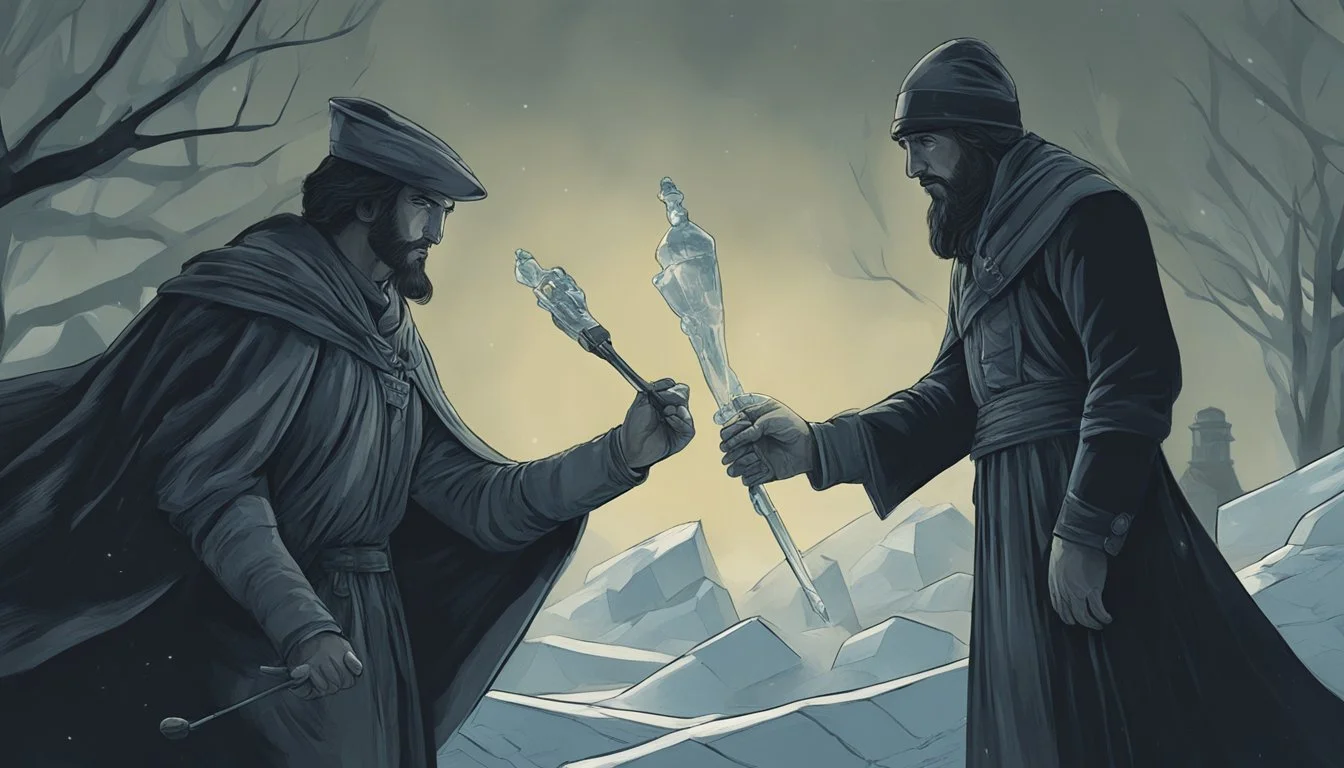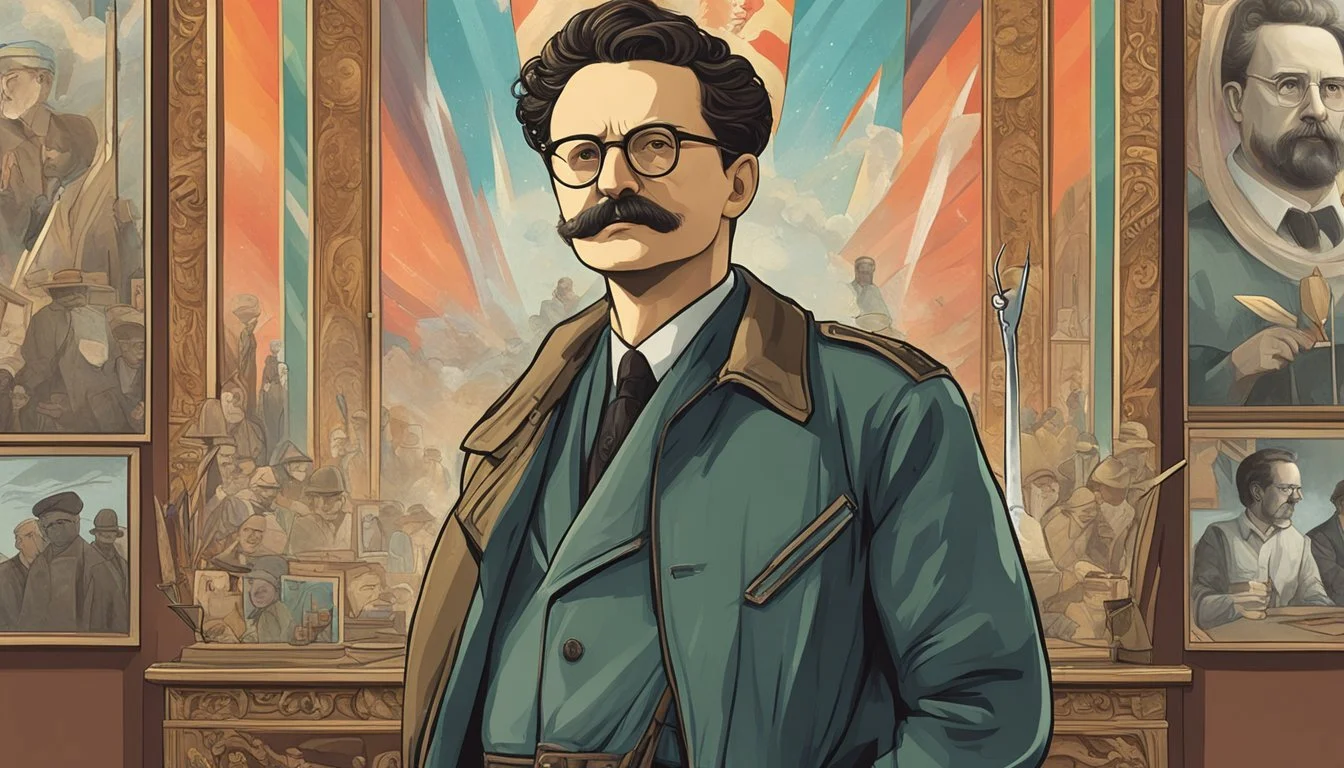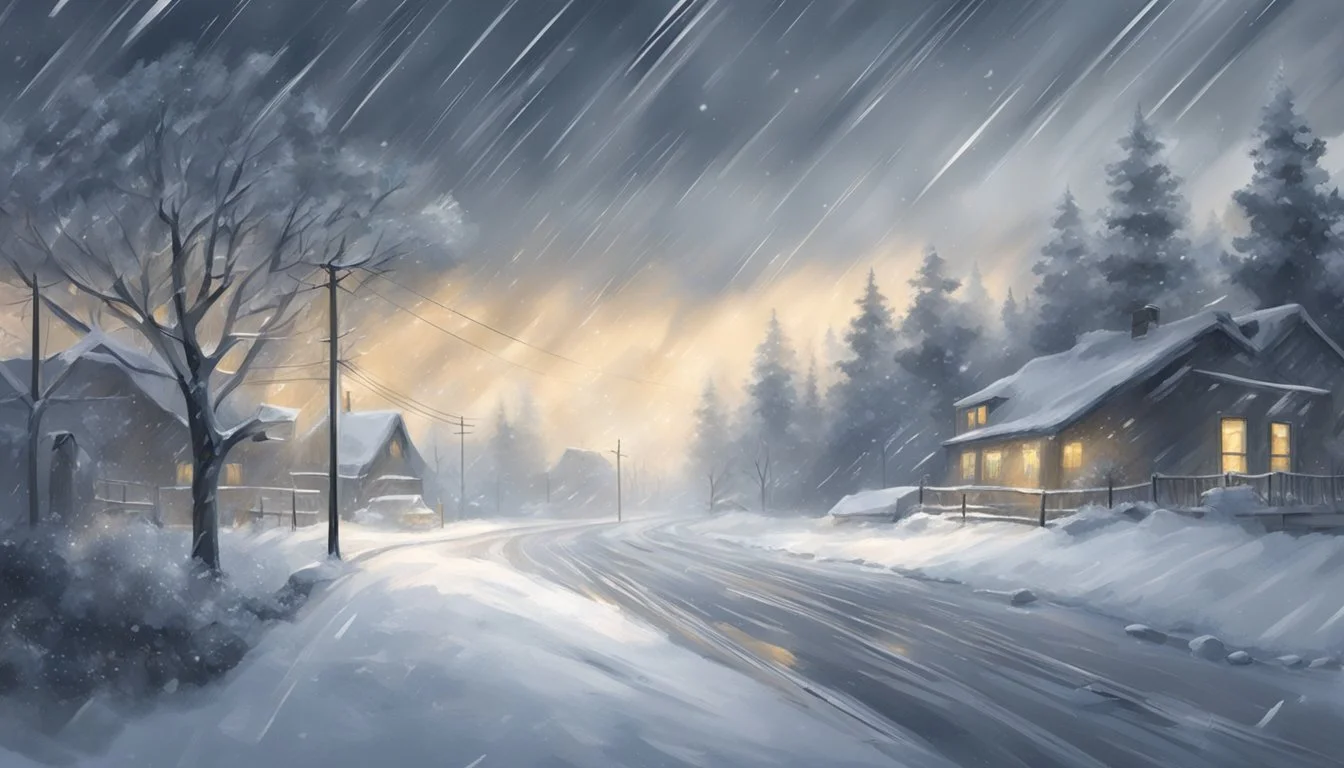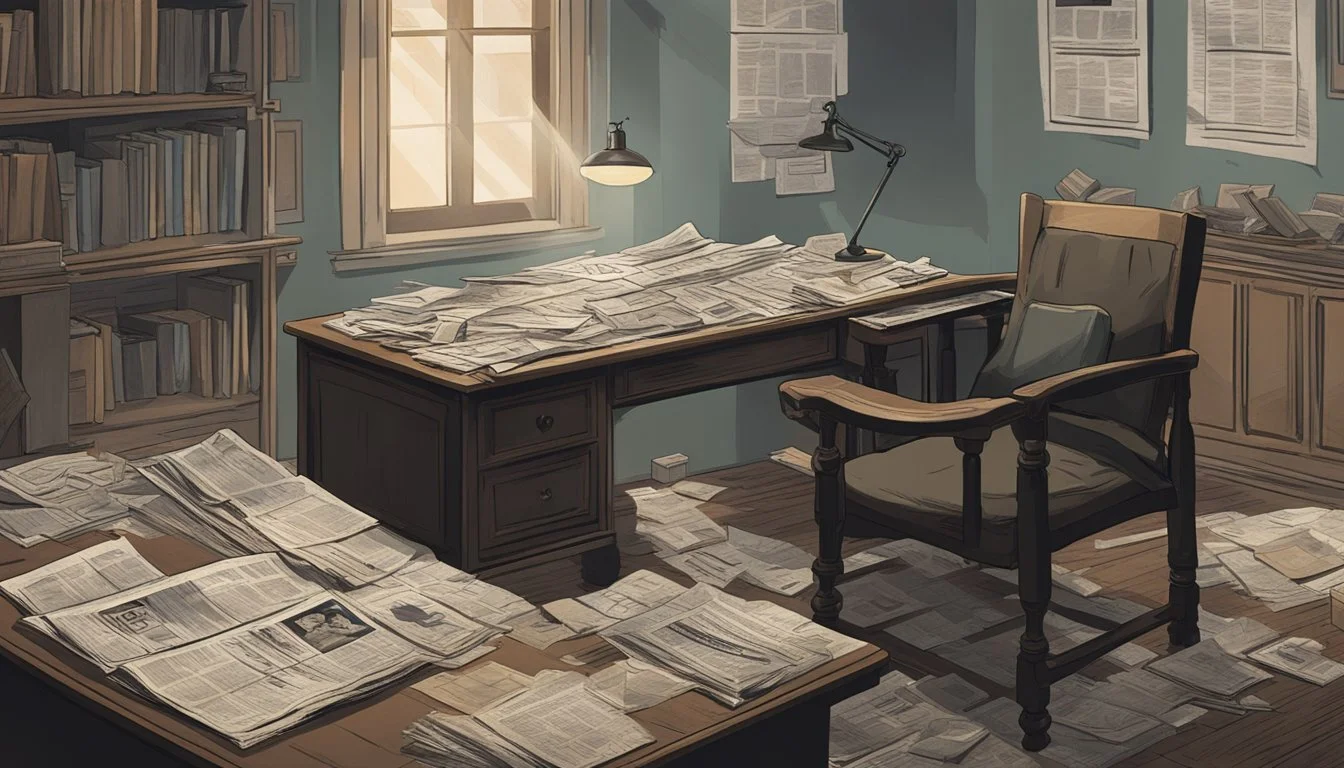Ice Pick to History: 7 Films on Trotsky's Assassination
Cinematic Portrayals of a Revolutionary's Demise
Leon Trotsky's assassination in Mexico City on August 20, 1940 remains one of the most infamous political murders of the 20th century. The brutal attack, carried out with an ice pick under Joseph Stalin's orders, shocked the world and marked the end of a revolutionary era. This pivotal moment in history has inspired numerous filmmakers to explore Trotsky's life, his exile, and the events leading up to his death.
The films examining Trotsky's assassination range from historical dramas to documentaries, each offering a unique perspective on this complex figure and the turbulent political climate of the time. By delving into Trotsky's final years in Mexico, his relationships, and the plot against him, these movies provide viewers with a deeper understanding of the man behind the revolutionary ideals and the forces that sought to silence him.
1) "The Assassination of Trotsky" directed by Joseph Losey
Joseph Losey's 1972 historical drama "The Assassination of Trotsky" depicts the final days of Leon Trotsky's life in Mexico. The film stars Richard Burton as Trotsky, Alain Delon as his assassin Frank Jacson, and Romy Schneider in a supporting role.
Set in 1940, the movie focuses on Jacson's infiltration of Trotsky's inner circle. Posing as a young communist, Jacson gains access to Trotsky's home with the intent to assassinate him on Stalin's orders.
Burton portrays Trotsky as a dry, pedantic figure, which some critics felt diminished the importance of his ideas. Delon's performance as the enigmatic assassin received mixed reviews, with some finding his character underdeveloped.
The film's pacing has been described as slow by some viewers, with tension building gradually towards the inevitable conclusion. Despite its star-studded cast and intriguing subject matter, the movie struggled to fully engage audiences.
"The Assassination of Trotsky" was screened at the New York Film Festival in October 1972. It remains a notable, if imperfect, cinematic portrayal of a significant historical event.
https://en.wikipedia.org/wiki/The_Assassination_of_Trotsky
2) "Frida" which includes a subplot on Trotsky's murder
The 2002 biographical drama "Frida" depicts the life of Mexican artist Frida Kahlo. Directed by Julie Taymor and starring Salma Hayek, the film explores Kahlo's tumultuous relationship with Diego Rivera and her brief affair with Leon Trotsky.
The movie portrays Trotsky's exile in Mexico and his connection to Kahlo and Rivera. It touches on the political tensions surrounding Trotsky's presence in the country and the looming threat of assassination.
While the film's primary focus is on Kahlo's life and art, it includes scenes related to Trotsky's murder. The assassination is not depicted in detail, but its impact on Kahlo and the political climate of the time is conveyed.
"Frida" received critical acclaim for its vivid portrayal of Kahlo's life and artistic vision. The subplot involving Trotsky adds historical context and highlights the intersection of art and politics in Kahlo's world.
https://en.wikipedia.org/wiki/Frida_(film)
3) "Trotsky" a biographical film starring Richard Burton
"The Assassination of Trotsky" is a 1972 British historical drama directed by Joseph Losey. The film stars Richard Burton as Leon Trotsky, the exiled Soviet revolutionary leader.
Set in Mexico in 1940, the movie focuses on the final days of Trotsky's life. It explores the events leading up to his assassination by Soviet agent Ramón Mercader, portrayed by Alain Delon.
Burton's performance as Trotsky captures the intellectual intensity and political fervor of the revolutionary figure. The film delves into Trotsky's continued political activities and writings while in exile.
Romy Schneider co-stars as Gita Samuels, a character involved in the complex web of relationships surrounding Trotsky. The movie examines the psychological aspects of the characters and the tense atmosphere of impending doom.
Losey's direction creates a sense of suspense and inevitability as the assassination plot unfolds. The film offers a dramatized account of this pivotal historical event, blending political intrigue with personal drama.
https://en.wikipedia.org/wiki/The_Assassination_of_Trotsky
4) "The Chosen" which delves into Trotsky's influence and death
"The Chosen" (2016) explores Leon Trotsky's final years in Mexico and the events leading to his assassination. The film portrays Trotsky as a revolutionary figure whose influence continued to shape global politics even in exile.
Director Antonio Chavarrías focuses on the complex plot to eliminate Trotsky. The movie depicts the 1940 machine gun attack on Trotsky's home, led by Mexican painter David Alfaro Siqueiros.
The film also examines Ramón Mercader's role in Trotsky's assassination. It shows how Mercader infiltrated Trotsky's inner circle through his relationship with Sylvia Ageloff, a devoted follower of the exiled revolutionary.
"The Chosen" offers a dramatized account of the tensions and paranoia surrounding Trotsky in his final days. It illustrates the far-reaching impact of his ideas and the lengths his opponents went to silence him.
The movie provides insight into the political climate of the time and the ongoing struggle between Trotskyism and Stalinism. It serves as a cinematic exploration of a pivotal moment in 20th-century history.
5) "Snowstorm in August" directed by Gabriel Pasternak
"Snowstorm in August" is a 2009 Russian historical drama film that explores the final days of Leon Trotsky's life. Directed by Gabriel Pasternak, the movie offers a unique perspective on the events leading up to Trotsky's assassination.
The film takes place in Mexico City, where Trotsky lived in exile. It portrays the revolutionary's daily life, his relationships with family and supporters, and the growing threats to his safety.
Pasternak's direction brings a sense of tension and impending doom to the narrative. The film's title refers to the unexpected nature of Trotsky's assassination, which occurred during the Mexican summer.
"Snowstorm in August" features strong performances from its cast, particularly in the portrayal of Trotsky and his assassin, Ramón Mercader. The movie delves into the psychological aspects of both characters, offering insights into their motivations and fears.
The film's cinematography captures the atmosphere of 1940s Mexico City, providing a vivid backdrop for the unfolding drama. Pasternak's attention to historical detail adds authenticity to the production.
https://www.kinopoisk.ru/film/445520/
6) "Trotsky's Death: Stalin's Revenge" a historical documentary
"Trotsky's Death: Stalin's Revenge" is a 2007 documentary that explores the events leading to Leon Trotsky's assassination. The film delves into the complex relationship between Trotsky and Joseph Stalin, examining their ideological differences and power struggles.
The documentary features interviews with historians and archival footage to provide context for the political climate of the 1930s. It details Stalin's rise to power and his efforts to eliminate perceived threats to his leadership.
Trotsky's exile and his life in Mexico are depicted, highlighting the constant fear of assassination attempts. The film reconstructs the events of August 20, 1940, when Ramón Mercader fatally wounded Trotsky with an ice axe.
The documentary also examines the aftermath of Trotsky's death and its impact on global politics. It offers insight into Stalin's motivations and the lengths he went to silence his former comrade and rival.
"Trotsky's Death: Stalin's Revenge" provides a balanced look at this pivotal moment in history, shedding light on the personal and political factors that led to Trotsky's demise.
https://www.imdb.com/title/tt1753856/
7) "Cold War" series which includes episodes on Trotsky
The "Cold War" documentary series, produced by CNN, offers a comprehensive look at the decades-long conflict between the United States and the Soviet Union. This 24-episode series covers various aspects of the Cold War, including key figures and events.
Episode 7, titled "After Stalin," touches on Leon Trotsky's role in the early Soviet Union and his eventual exile. The episode explores how Trotsky's ideas continued to influence communist movements even after his assassination.
The series provides context for Trotsky's life and death within the broader framework of Soviet history and global politics. It examines how his assassination in Mexico impacted the international communist movement and Soviet relations with the West.
"Cold War" uses archival footage, interviews with historians, and dramatic reenactments to bring this complex period to life. The series offers viewers a balanced perspective on Trotsky's legacy and its lasting effects on the Cold War era.
https://www.imdb.com/title/tt0170669/
Historical Context of Trotsky's Assassination
Leon Trotsky's assassination in 1940 marked the culmination of a long-standing political rivalry and ideological conflict within the Soviet leadership. His death came after years of exile and continued political activism against Stalin's regime.
Trotsky's Role in the Russian Revolution
Leon Trotsky played a crucial role in the Russian Revolution of 1917. As a key Bolshevik leader, he organized the Red Army and helped secure victory in the Russian Civil War.
Trotsky served as the first leader of the Soviet Red Army and was instrumental in implementing communist policies in the early years of the Soviet Union. His intellectual contributions shaped Marxist theory and revolutionary strategy.
Initially seen as Lenin's potential successor, Trotsky's influence in the Communist Party grew rapidly. However, his rivalry with Joseph Stalin intensified after Lenin's death in 1924.
Exile and Political Activities
Stalin's rise to power in the mid-1920s led to Trotsky's expulsion from the Communist Party in 1927. He was subsequently exiled from the Soviet Union in 1929.
Trotsky settled in Mexico in 1936 after periods of exile in Turkey and France. From there, he continued his vocal opposition to Stalin's leadership and policies.
His writings and organizing efforts aimed to build a "Fourth International" as an alternative to Stalin's version of communism. This political activity made Trotsky a target for Soviet agents.
Stalin viewed Trotsky as a significant threat to his authority. On August 20, 1940, an assassin named Ramon Mercader fatally wounded Trotsky with an ice pick in Mexico City.
Film Depictions of Trotsky's Assassination
Leon Trotsky's assassination has captivated filmmakers for decades. Movies have explored this historical event from various angles, blending factual elements with artistic interpretations.
Creative Interpretations in Cinema
"The Assassination of Trotsky" (1972) stands out as a notable film on the subject. Directed by Joseph Losey, it stars Richard Burton as Trotsky and Alain Delon as his assassin, Frank Jacson. The movie delves into the final days of Trotsky's life in Mexico.
"El Elegido" ("The Chosen"), an upcoming film, promises a fresh take on the assassination plot. Directed by Antonio Chavarrias, it focuses on the love and betrayal surrounding Trotsky's murder.
Several other films have tackled this historical event, each offering unique perspectives on the characters involved and the political climate of the time.
Historical Accuracy and Dramatic License
Filmmakers often balance historical facts with dramatic storytelling. Some movies strive for accuracy in depicting Trotsky's life in Mexico and the circumstances of his assassination.
Others take creative liberties to enhance the narrative. The use of the ice pick as the murder weapon has become an iconic element in these films, often dramatized for cinematic effect.
Directors and screenwriters face the challenge of portraying complex historical figures like Trotsky and his assassin, Ramon Mercader. They must navigate the fine line between factual representation and compelling storytelling.





